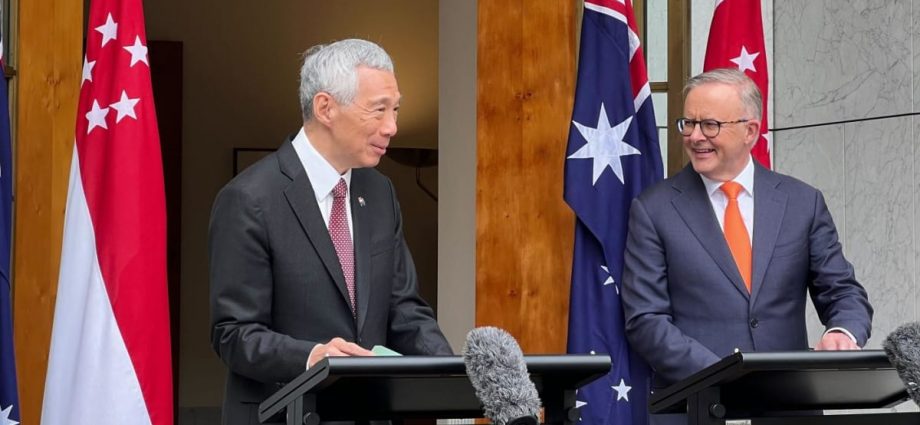
Singapore and Australia are “natural partners” that share similar views on many issues, said Mr Lee.
“And (we are) trusted and reliable partners of each other, which we have demonstrated during the pandemic,” he added.
“So we’re looking at new strategic areas of cooperation such as strengthening the security and resilience of our supply chains, including on food and energy, and our connectivity to the rest of the world. And we will also look into facilitating the flow of critical goods between us in times of crisis.”
The Green Economy Agreement signals “collective resolve” to confront challenges as Singapore and Australia transition their economies to net zero, said Mr Albanese.
“It will support clean energy innovation, unlock business opportunities and create jobs, and help deliver our emissions targets while positioning Australia as a renewable energy superpower,” said the Australian Prime Minister.
“Our commitment to work towards a food pact will shore up reliable and secure supply chains and provide certainty for Australian exporters. We also discussed the strategic outlook and our commitment to a free, open and resilient region.”
Mr Albanese was sworn in as Australia’s prime minister after the country’s new Labor government came into power in May 2022.
GREEN ECONOMY AGREEMENT
Since the Green Economy Agreement is a significant new area of cooperation, Singapore and Australia will establish a new green economy pillar under their comprehensive strategic partnership, which was established in 2015.
The agreement will reduce barriers to cross-border trade in clean energy, as well as green trade and investment, said the Ministry of Trade and Industry (MTI) and Ministry of Sustainability and the Environment (MSE) in a separate press release on Tuesday.
Under the agreement, Singapore and Australia have agreed on an early list of 17 joint initiatives, Mr Lee noted.
For example, Singapore and Australia will work together to support small-to-medium enterprises in their efforts to jointly develop innovative green products, services and technologies through grants and business matching services, said MTI and MSE in the press release.
To explore cross-border electricity trade, the two countries will also establish a joint working group to develop the architecture for this trade, and enhance regional energy connectivity.
Australia and Singapore will also collaborate on ideas that promote best practices for sustainable agri-food systems. The aim is to reduce global food security concerns, limit the effects of climate change, and reduce the impact of agri-food systems on the environment, the press release read.
Responding to a question about a data breach at Singtel-owned Optus, Mr Lee stressed that all Singapore companies are expected to comply fully with domestic laws wherever they operate, and cooperate with domestic regulators to protect consumers’ interests.
The breach was one of Australia’s biggest, in which the data of up to 10 million customers – including home addresses, driver’s licenses and passport numbers – was compromised.
“In the case of Optus, this is an Australian company is incorporated and headquartered in Australia. Its operations are run out of Australia and not from Singapore and therefore Australia’s rules and regulations apply in addressing this incident,” said Mr Lee.
Singtel is taking the incident seriously and will fully support Optus in meeting Australia’s rules and requirements in handling the incident, he added.
“Our cybersecurity and infocomm agencies have also reached out to their Australian counterparts. We stand ready to provide support to the Australian government, should our assistance be needed.”
Despite the COVID-19 pandemic, bilateral cooperation between Singapore and Australia has continued, said Mr Lee during the joint press conference.
Singaporeans were the fourth-largest group of short-term visitors to Australia in the first half of this year, he added.
Mr Albanese thanked Singapore for the role it played during the pandemic.
“It might not be known by all Australians, but essentially without Singapore and its support by air and by sea, the vaccine – to enter this country – wouldn’t have been possible. Along with PPE, along with ventilators, Singapore played such a critical role.”
Mr Lee welcomed Mr Albanese’s efforts to deepen Australia’s engagement with Southeast Asia.
“We are very happy that the relations between our two countries have remained strong,” he added. “It’s a troubled world. Given the tensions in the world, it is important that like-minded partners work together for our mutual benefit.”
Responding to a question about how Singapore and Australia are maintaining security and cooperation in supply chains amid increasing geopolitical instability, Mr Lee.
“Countries are going for resilience. But it’s not possible for us to go for self-sufficiency. We’re too interdependent,” he added.
“You will do business with everybody, but with countries where you have a deep established relationship of trust and confidence, you can do even more. And in the case of Singapore and Australia, we do have that reservoir of trust and confidence and history. And we are working to deepen this.”

